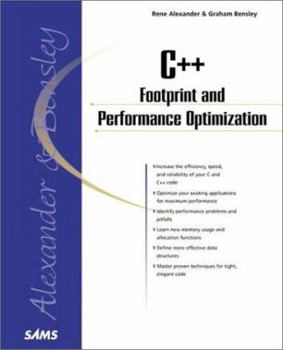C++ Footprint and Performance Optimization
Select Format
Select Condition 
Book Overview
This text aims to supply programmers with the knowledge they need to write code for the increasing number of hand-held devices, wearable computers and intelligent appliances. It contains case studies... This description may be from another edition of this product.
Format:Paperback
Language:English
ISBN:0672319047
ISBN13:9780672319044
Release Date:January 2000
Publisher:Sams
Length:388 Pages
Weight:1.90 lbs.
Dimensions:0.9" x 7.3" x 9.1"












